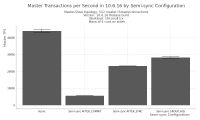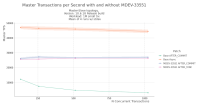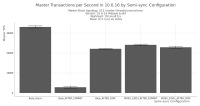Details
-
Bug
-
Status: Closed (View Workflow)
-
Major
-
Resolution: Fixed
-
10.5(EOL), 10.6, 10.11, 11.0(EOL), 11.1(EOL), 11.2(EOL), 11.3(EOL)
-
None
Description
Semi-sync Wait Point AFTER_COMMIT Slow on Workloads with Heavy Concurrency
When using semi-sync replication with rpl_semi_sync_master_wait_point=AFTER_COMMIT, the performance of the primary can significantly reduce to about 10% of AFTER_SYNC's performance for workloads with many concurrent users executing transactions. See the attached graph, where the "Async" bar reports the performance of a primary using asynchronous replication, the "Semi-sync AFTER_COMMIT" and "Semi-sync AFTER_SYNC" reports the performance of the primary using the respective rpl_semi_sync_master_wait_point variable, and "Semi-sync GROUP_ACK" is a prototype of the work outlined by MDEV-33491.
It can be seen that the performance of the AFTER_COMMIT mode of semi-sync is many times worse than that of the AFTER_SYNC mode. This is because all connections on the primary share the same cond_wait variable/mutex pair, so any time an ACK is recieved from a replica, all waiting connections are awoken to check if the ACK was for itself, which is done in a mutual exclusion zone. See the attached Semi-sync Group Ack Proposal PDF for more details.
Instead, each connection should use its own condition variable (e.g. THD::COND_wakeup_ready), and the ACK receiver thread should only signal connections which have been ACKed for wakeup.
Attachments
Issue Links
- causes
-
MDEV-34122 Assertion `entry' failed in Active_tranx::assert_thd_is_waiter
-
- Closed
-
-
MDEV-36359 Crash after disabling semi sync + start a master switchover process
-
- Closed
-
-
MDEV-36934 semi sync makes the master unresponsive when a replica is stopped
-
- Closed
-
- duplicates
-
MDEV-34462 SemiSync replication underperforming and stalling throughput
-
- Closed
-
- relates to
-
MDEV-33491 Semi-sync Replication Group ACK
-
- Stalled
-


